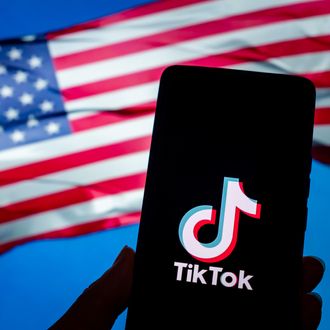
TikTok is destined to be “un-alived” in the United States. Last April, President Joe Biden signed a bill banning the first globally successful Chinese social-media app if its parent company, ByteDance, doesn’t sell its shares by January 19. TikTok challenged the bill and presented its case to the Supreme Court on January 10, before a January 17 verdict made it official: The government is allowed to ban the app. Below, what you need to know about how we got here and what’s going to happen to your emotional-support app.
What did the Supreme Court rule?
A January 17 decision officially determined that the government has the right to ban the app, despite the president-elect’s meddling. “There is no doubt that, for more than 170 million Americans, TikTok offers a distinctive and expansive outlet for expression, means of engagement, and source of community,” the court said in its unsigned opinion, per NPR. “But Congress has determined that divestiture is necessary to address its well-supported national security concerns regarding TikTok’s data collection practices and relationship with a foreign adversary. We conclude that the challenged provisions do not violate petitioners’ First Amendment rights.”
However, the court also acknowledged the January 19 time constraint: “Our analysis must be understood to be narrowly focused in light of these circumstances,” the justices wrote, emphasizing that this ruling should not be considered a precedent.
Is TikTok shutting down?
Well, yes! Biden signed the Protecting Americans From Foreign Adversary Controlled Applications Act into law on April 24, which would officially ban TikTok on January 19, 2025, if ByteDance doesn’t sell the app in the U.S. But ByteDance says it has no intention of selling, despite fielding an offer from Shark Tank’s Kevin O’Leary, of all businesspeople.
Why is TikTok getting banned?
The government argues that the information collected from the app could be used by the Chinese government for “espionage or blackmail,” per CBS News, or to “advance its geopolitical interests” by “sowing discord and disinformation during a crisis.”
“In response to those grave national-security threats, Congress did not impose any restriction on speech, much less one based on viewpoint or content,” the Justice Department states. “Instead, Congress restricted only foreign adversary control: TikTok may continue operating in the United States and presenting the same content from the same users in the same manner if its current owner executes a divestiture that frees the platform from the [People’s Republic of China’s] control.”
TikTok’s lawyers presented arguments that the bill violates the First Amendment’s right to free speech against what the government claims are threats posed by the app. “The Supreme Court has an established historical record of protecting Americans’ right to free speech, and we expect they will do just that on this important constitutional issue,” Michael Hughes, a spokesman for ByteDance, previously stated. “Unfortunately, the TikTok ban was conceived and pushed through based upon inaccurate, flawed, and hypothetical information, resulting in outright censorship of the American people.”
Can you still use TikTok if it’s banned?
If the law goes into effect, TikTok cannot be updated or downloaded from the App Store, but the app won’t suddenly disappear from all phones. Lawmakers wrote a letter on December 13 to Apple and Google, telling them to be ready to remove the app from their stores, per Reuters.
When will the ban begin?
If the Supreme Court upholds the ban, then it will begin on January 19. But Gen Z may have already found an alternative and, sorry Zuckerberg, it’s not Instagram Reels.

